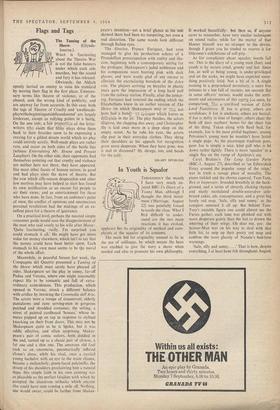Flags and Tags
The Taming of the
Shrew. (Glynde- bourne.) by waving their flag in the first place. Unneces- sary terms like theatre of violence, or of the absurd, seek the wrong kind of publicity, and are anyway far from accurate. In this case, both the tags of Theatre of Cruelty and `awellmade- playwithabeginningamiddleandanend' are largely irrelevant, except as rallying points in a battle, On the one side, a fair proportion of the letter- writers 1,1,iho elaim tliat filthy plays drive them back to their firesides seem to be expressing a craving for a gilded dream world which no play could entirely satisfy. Well-made plays are rather rare, and occur on both sides of the battle line (witness Entertaining Mr. Sloane and Present Laughter). On the other side, their opponents find themselves pointing out that cruelty and violence are neither here nor there; they have appeared, like most other facets of human nature, in good and bad plays since the dawn of theatre. But the row which silly-season desperation and other low motives may have helped to start has found its own justification as an excuse for people to air their views; and as. entertainment for those who have none. In fact, from an audience's point of view, the conflict of opinions and unconscious personal revelations had the makings of an ex- cellent piece for a theatre of ignorance.
On a practical level, perhaps the mooted simple consumer guide would save the disappointment of the man who said sourly to his wife after Maras: 'Quite fascinating, really. I'm surprised you could stomach it all.' He might have got more value for money elsewhere, which isn't to say that the money could have been better spent. Each stomach to his own meat seems to be tile moral of the whole affair.
Meanwhile, in peaceful Sussex last week, the Compagnia del Quattro presented a Taming of the Shrew which must surely have pleased all sides. Shakespeare set the play in sunny, far-off Padua and Verona, where one might reasonably expect life to be romantic and full of extra- ordinary coincidences. This production, which opened in Verona, struck a different balance With artifice by invoking the Cornmedia dell'Arte. The actors were a troupe of innaniornti, elderly pantaloons and zany serving-men in gorgeous patched and shredded costumes; the setting, a street of painted cardboard `houses,' whose in- mates popped up on top in response to stylised knocking on their front doors. This may not be Shakespeare quite as he is Spoke, but it was oddly effective, and often surprising. Shakes- peare's pair of comic suitors, both diddled in the end, turned up as a classic pair of clowns, a fat one and a thin one. The amorous old fool took to an enormous, pneumatically inflated clown's ,dress, while his rival, once a cynical Young bachelor with an eye to the main chance, became a melancholy, green-faced pulcinello, the droop of his shoulders proclaiming him a natural dupe. His simple faith in his own cunning was as plausible as the perfect fatalism with which he accepted the disastrous setbacks which anyone else could have seen coming a mile off. Nothing. one would swear, could be farther from Shakes-
peare's intention—yet a brief glance at the text showed there had been no tampering, not even a real distortion. The same words look different through Italian eyes.
The director, Franco Enriquez, had even managed to give his production echoes of a Pirandellian preoccupation with reality and illu- sion, beginning with a contemporary setting for
• the prologue. Shakespeare's jaded nobleman and his companions wore hunting pink with dark glasses, and were wanly glad of any excuse to alleviate the excruciating boredom of the dolce vita. The players arriving on bicycles in plastic macs gave the impression of a long hard pull from the railway station. Finally, after the junket- ing, Enriquez had restored the ending which the Elizabethans knew in an earlier version of The Shrew (in which Shakespeare may or r.r.;...); not have had a hand)--an oogue which leaves us delicakiy in the air. The play finishes, the actors disperse, the clapping dies away, and Christopher Sly is laid once more in a deep sleep on the empty street. As he rubs his eyes, the actors slip past in their everyday clothes. They shrug their shoulders as his appeals for recognition grow more desperate. When they have gone, was it real or dreamed? Sly shrugs, too, and heads for the cafe.
HILARY SPURLING






































 Previous page
Previous page